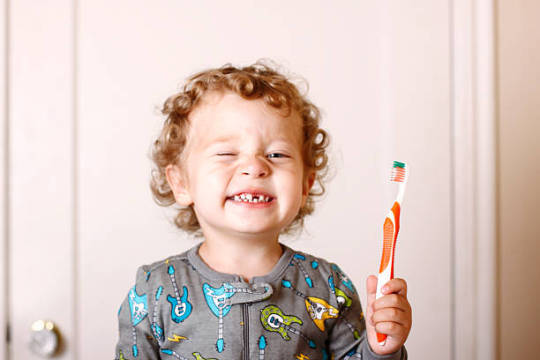When should I schedule my child’s first trip to the dentist? Should my 3-year-old be flossing? How do I know if my child needs braces?
Many parents have a tough time judging how much dental care their kids need. They know they want to prevent cavities, but they don’t always know the best way to do so. Here are some tips and guidelines.

When Should Kids Start Brushing Their Teeth?
Good dental care begins before a baby’s first tooth appears. Just because you can’t see the teeth doesn’t mean they aren’t there. Teeth actually begin to form in the second trimester of pregnancy. At birth, your baby has 20 primary teeth, some of which are fully developed in the jaw.
Here’s when and how to care for those little choppers:
- Even before your baby starts teething, run a clean, damp washcloth over the gums to clear away harmful bacteria.
- Once your baby gets teeth, brush them with an infant toothbrush. Use water and a tiny bit of fluoride toothpaste (about the size of a grain of rice). Use fluoride toothpaste that carries the American Dental Association’s (ADA) seal of acceptance. (If you are using baby toothpaste without the fluoride, keep it to the same amount because you still want to minimize any toothpaste that is swallowed.)
- Once your baby’s teeth touch, you can begin flossing in between them.
- Around age 2, your child should learn to spit while brushing. Avoid giving your child water to swish and spit because this might make swallowing toothpaste more likely.
- Kids ages 3 and up should use only a pea-sized amount of fluoride toothpaste.
- Always supervise kids younger than 6 while brushing, as they are more likely to swallow toothpaste.
Even babies can develop tooth decay if good feeding habits aren’t practiced. Putting a baby to sleep with a bottle might be convenient, but can harm the baby’s teeth. When the sugars from juice or milk remain on a baby’s teeth for hours, they can eat away at the enamel, creating a condition known as bottle mouth. Pocked, pitted, or discolored front teeth are signs of bottle mouth. Kids with severe cases might develop cavities and need all of their front teeth pulled (permanent teeth will grow in later).
Parents and childcare providers should help young kids set specific times for drinking each day because sucking on a bottle throughout the day can be equally damaging to young teeth. Babies as young as 6 months are encouraged to switch from a bottle to a sippy cup(with a straw or hard spout). By 12 months of age, they’ll have the motor skills and coordination to use the cup on their own.
